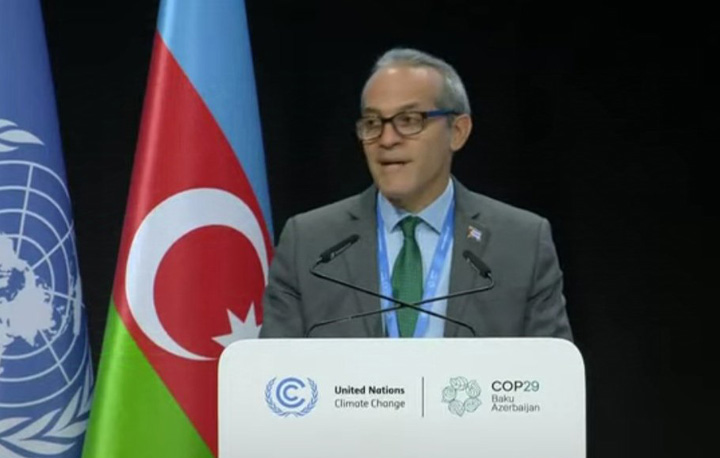
Photo: @citmacuba
Baku, November 19 (RHC)-- "Cuba is the victim of the longest economic, commercial and financial blockade ever imposed by the U.S. government on any nation in history," denounced Armando Rodríguez Batista, Cuban Minister of Science, Technology and Environment (Citma).
Rodríguez Batista condemned such a generalized war while speaking at the ministerial round table on Just Transition of the program of the United Nations Climate Change Conference (COP29), which concludes this Friday in Baku, capital of Azerbaijan, on the Caspian Sea coast.
That unilateral U.S. policy is our main obstacle to sustainable development, he warned in his speech, a version of which was provided by his agency's Communications Department.
To illustrate it in figures, it is estimated that, from March 1, 2023 to February 29, 2024, it caused damages and material damages to Cuba estimated in the order of 5 thousand 56.8 million dollars, which represents an increase of 189.8 million with respect to the previous report, he emphasized.
Regarding the new COP29 program, he reflected: “climate justice, equity and the principles of common but differentiated responsibilities and respective capacities must be at its core. The discussion on how these can be implemented is crucial.” He stressed that “just transition encompasses adaptation, mitigation, loss and damage, and means of implementation. For our developing countries, it is critical to prioritize adaptation from a just transition perspective.”
However, he added, addressing the adaptation gap whether in national science and innovation capacities, financing, planning or implementation, must be aligned with just transition criteria towards more resilient economies.
“A truly just, equitable and orderly transition will not be possible without developed countries honoring their commitments and taking the lead in climate action and the provision of finance and means of implementation to achieve the goals set out in Article 2 of the Paris Agreement,” he said,.
He opined that the international context can either facilitate or become a barrier to such a transition, the difference lies in an empowerment of international cooperation, or not, over policies such as unilateral coercive measures and international trade barriers. The head of Citma and his entourage later held a meeting with Emin Amrullayev, Minister of Higher Education of Azerbaijan.
Both reiterated the historical nature of relations between their nations, the good state of ties and agreed to expand them in the field of Science, Technology and Innovation in areas of mutual interest, for which purpose they will promote links between their research institutes and universities. They agreed to take the necessary steps to institutionalize their ministerial ties.
Amrullayev was interested in cooperation in the field of high-performance sports, an area in which Cuba has vast experience and international results, and the important role played by Cuban medical cooperation in his country.
Last March 28th, Cuba and Azerbaijan celebrated the 32nd anniversary of the establishment of diplomatic relations, which have been characterized by ties of friendship and close cooperation, supported by a permanent bilateral dialogue, in the exercise of negotiations in multilateral forums, expanding friendship and cooperation for the benefit of both peoples. (ACN)

